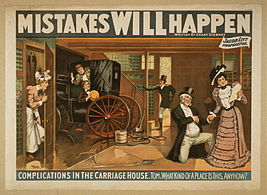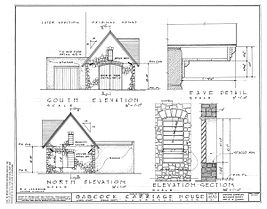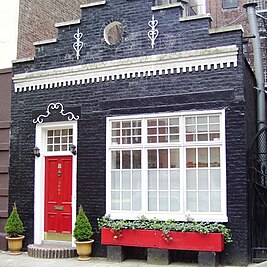Carriage house




A carriage house, also called a remise or coach house, is a term used in North America to describe an outbuilding that was originally built to house horse-drawn carriages and their related tack.[1] Carriage houses were often two stories, with related staff quarters above.
Current usages
In modern usage, the term "carriage house" has taken on several additional, somewhat overlapping meanings:
- Buildings that were originally true carriage houses that have been converted to other uses such as secondary suites, apartments, guest houses, automobile garages, offices, workshops, retail shops, bars, restaurants, or storage buildings.[citation needed]
- Purpose-built secondary homes, also called accessory dwelling units or detached dwelling units, on the same lot as a primary residence. They have completely separate living areas and facilities, sometimes in the style of converted carriage houses.[2] Some municipalities, such as Ottawa, Ontario, Canada, have introduced regulations permitting coach houses to intensify use of urban residential space and increase affordability and possibilities for multi-generational housing in low-density areas,[3] whereas the state of California revised state laws to limit local governments' authority to restrict ADU construction and reduce cost and bureaucracy hurdles in order to ease the shortage of housing.[4][5]
- A marketing term for single-family homes, built on a lot just large enough for the home, and often sharing in common land with other homes in the same planned unit development. They are more properly called "carriage homes" or "patio homes". Some municipalities have relaxed setback restrictions for such buildings or allow "zero lot line" carriage homes, in which a wall of the home lies on the property line itself.[6]
Other modern uses
Because of the prestigious nature of some large, elaborate carriage houses, the term "carriage house" is commonly used as part of the name of businesses such as antique shops and restaurants. Sometimes these businesses are housed in former carriage houses. Property developers are now including coach houses in their portfolios. The unique architectural features and integrated space for potential car parking make it an attractive offering to many clients.[7]
See also
- Charles O. Boynton Carriage House
- Ladd Carriage House
- Pfeiffer House and Carriage House
- John G. and Minnie Gluek House and Carriage House
- Accessory dwelling unit
- Mews
References
- ^ AMERICAN COUNTRY BUILDING DESIGN: Rediscovered Plans For 19th-Century American Farmhouses, Cottages, Landscapes, Barns, Carriage Houses & Outbuildings, Donald J. Berg, 1997
- ^ "Project Guide for Detached Dwelling Units". Denver Development Services. City of Denver, Colorado. Archived from the original on 21 May 2024. Retrieved 31 May 2018.
- ^ Davies, Emily (Fall 2017). "Coach Houses: The Multi-Generational Housing Solution" (PDF). Plan Canada. 57 (3): 39–40. doi:10.25316/IR-3220. ISSN 0032-0544. Archived (PDF) from the original on 2024-05-21. Retrieved 2021-10-23.
- ^ Pender, Kathleen (2016-12-03). "New California housing laws make granny units easier to build". San Francisco Chronicle. Archived from the original on 2018-06-15. Retrieved October 22, 2021.
- ^ Wong, Queenie (September 27, 2016). "California eases restrictions on 'granny units'". San Jose Mercury News. Archived from the original on October 19, 2016.
- ^ Sager, Jeanne (31 Jan 2018). "What Is a Carriage House? Horses Not Included". Realtor.com. Move, Inc. Archived from the original on 2 February 2018. Retrieved 31 May 2018.
- ^ "What is a coach house in a modern era?". HBF. Archived from the original on 2024-05-21. Retrieved 2021-12-07.
